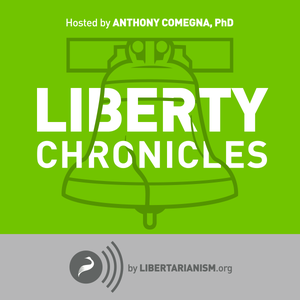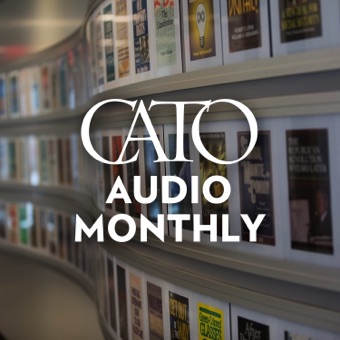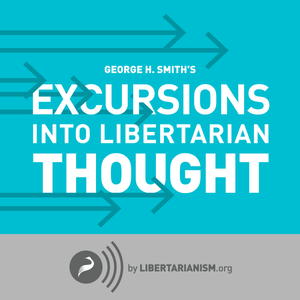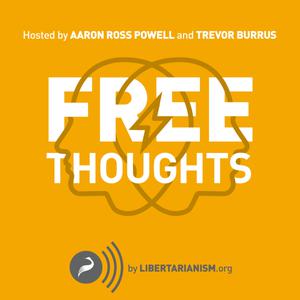
Liberty Chronicles
Libertarianism.org
- 3 minutes 14 secondsComing Soon: The Liberty ExchangeComing soon, a brand new podcast from Libertarianism.org...
Hosted on Acast. See acast.com/privacy for more information.
2 October 2023, 12:00 am - 28 minutes 23 secondsEp. 105: The Last Liberty Chronicles
Today Anthony Comegna (@DrLocoFoco) leaves us with one final message as we end chronicling liberty: “I certainly will continue my own end of the deal we have struck here—you couldn’t drag me away from my Locofocos, my Spiritualists, my Free Love anarchists, or my radical English Dissenters, to name just a few—but I’ll close with one final plea to each of you: History is not an instruction manual; it is a cautionary tale. No intellectual tradition, no set of good or just ideas, no heroes nor villains are ever remembered unless we do the labor of memory. Our tradition, our ideas, our tales of heroes and our villains all deserve to be remembered, and we deserve to learn from their examples.”
Be sure to check back with libertarianism.org to learn about our new history adventures in the coming months.
Our Most Memorable Episodes:
The Possession of Frances Whipple
Reasonable Crimes: Humanizing Pirates
There’s No Excuse for Slavery (Updated)
Hosted on Acast. See acast.com/privacy for more information.
7 May 2019, 4:15 am - 1 hour 15 minutesEp. 104: The United States as a Young Foreign Power, Part Two, with Christopher A. Preble
Last week we left off with selections from William Graham Sumner and we pick up right there today with Christopher Preble. Preble’s new book was released today on our site and it not only explores America imperialist tendency in the past, but also recognizes our foreign policy blunders of today.
Does the U.S. think they are in a perfect position to solve the problems of other countries? How did the war against Spain turn out? Does the American imperial empire exist today? When did the U.S. start to get influenced by the imperial mindset of Europe? What is corporatism? Was it honorable to be a soldier in the 1900s? What was the anti-war movement and what happened to it after World War II?
Further Reading:
Peace, War, and Liberty: Understanding U.S. Foreign Policy, written by Christopher A. Preble, available April 30, 2019.
Dreams of a City on a Hill, 1630, written by John Winthrop
Related Content:
Address Delivered at the Request of the Committee for Arrangements for Celebrating the Anniversary of Independence, written by John Quincy Adams
Jackson: The First Imperial President, Learn Liberty
The Conquest of the United States by Spain, written by William Graham Sumner
Hosted on Acast. See acast.com/privacy for more information.
30 April 2019, 4:15 am - 50 minutes 32 secondsEp. 103: The United States as a Young Foreign Power, with Christopher A. Preble
Christopher A. Preble joins us for the first episode of a 2-part discussion about early America’s role in the world. Comegna and Preble focus their conversation around two historical documents that are cited in Preble’s new book Peace, War, and Liberty. The first document is John Quincy Adam’s “Address Delivered at the Request of the Committee for Arrangements for Celebrating the Anniversary of Independence”. The second document is, “The Conquest of the United States by Spain”. Be sure to tune in next week to hear part 2 of this discussion and to download a free copy of the Preble’s book!
What is realpolitik? Why weren’t Native Americans seen as sovereign peoples by the United States? What did Americans think of their place in the world by 1820? Did Americans still fear the British in 1820? How did we use the Navy to expand markets in the early and late 1800s?
Further Reading:
Peace, War, and Liberty: Understanding U.S. Foreign Policy, written by Christopher A. Preble, available April 30, 2019.
Dreams of a City on a Hill, 1630, written by John Winthrop
Related Content:
Address Delivered at the Request of the Committee for Arrangements for Celebrating the Anniversary of Independence, written by John Quincy Adams
Jackson: The First Imperial President, Learn Liberty
The Conquest of the United States by Spain, written by William Graham Sumner
Hosted on Acast. See acast.com/privacy for more information.
23 April 2019, 4:15 am - 23 minutes 37 secondsEp. 102: What it Takes to be a Bankster
Can you imagine people getting themselves all worked up over banks and money today? Having that intensely boring issue so thoroughly dominate political life that presidents and parties rise and fall on this one subject alone? No one today knows anything about the Fed and no one wants to know about the Fed. People back in the 1830s and ‘40s, were in a constant state of agitation about it. It seemed to Jacksonian Americans that the individual pursuit of self interest was natural and inevitable.
What was important about Adam Smiths’ Wealth of Nations? Were banks corrupt? Have banks always been corrupt? How did views of banks and the Fed change since Jacksonian America?
Further Reading:
The Myth of Class in Jacksonian America, Cambridge University Press
The Bank War and the Partisan Press, written by Stephen W. Campbell
Andrew Jackson, Banks and the Panic of 1837, Lehrman Institute
Related Content:
Jackson Kills the Bank, Part One, written by Andrew Jackson
Jackson Kills the Bank, Part Two, written by Andrew Jackson
Make America Young Again, Liberty Chronicles Podcast
Hosted on Acast. See acast.com/privacy for more information.
16 April 2019, 4:15 am - 24 minutes 9 secondsEp. 101: Edgar Allan Poe on Mushrooms and Men
Edgar Allen Poe was far from being defined as a Locofoco. He was no lover of democracy. He idolized the “devoted loyalty” of old Virginia gentry. As a dark romanticist poet, he believed the America’s Old World aristocracy was fighting the noble cause of attempted to preserve the elevated cultures of the past.
What did Edgar Allen Poe think of the class struggle? Did Edgar Allen Poe think that Americans were spoiled? How did Poe think America erected an aristocracy? Was Edgar Allen Poe a conservative?
Further Reading:
The Fall of the House of Usher (Story by Poe), written by David Rush
Edgar Allen Poe, Poetry Foundation
Who was Edgar Allen Poe?, The Poe Museum
Related Content:
Mushrooms & Men, Liberty Chronicles Podcast
An Introduction to Imaginative Literature, Part IV, written by Jeff Riggenbach
Libertarians, Class, and the Left, Anthony Comegna & Caleb O. Brown
Hosted on Acast. See acast.com/privacy for more information.
9 April 2019, 4:15 am - 29 minutes 32 secondsEp. 100: Quakertarianism, with Caleb Brown
For our 100th episode we interviewed Caleb Brown to gain a better understanding of how Quakerism aligns with libertarianism. He discusses his own experience as a Quaker, but he also makes larger claims about how Quakerism can foster a sense of community to the life of an average libertarian.
What is attractive about Quakerism? What is a ‘true-believer’ Christian? How does Quakerism mesh with libertarianism? Are there a lot of communitarian elements to Quakerism? How do Quaker meetings take place? What role does Quakerism play in your life?
Further Reading:
Friends for 300 Years, written by Howard H. Brinton
Amazing Grace, directed by Michael Apted
Cato Daily Podcast
Related Content:
Libertarians, Class, and the Left, interview between Anthony Comegna and Caleb Brown
The Antinomians, Liberty Chronicles Podcast
Sam Gorton: Antinomian Radical, by Literature of Liberty Reviewer
Hosted on Acast. See acast.com/privacy for more information.
2 April 2019, 4:15 am - 27 minutes 34 secondsEp. 99: Mushrooms & Men
For classical liberals and libertarians, class is a social phenomenon marked by largely artificial distinctions between people based mainly on their access (or lack of access) to raw physical force and a willingness to use force against other people. Classes do not form in society simply because some people have more material wealth racked up than others, nor because some people are better at drawing or sewing or rollerblading than others. Even ideological content of the mind is not really the stuff of class. Sure, plenty of societies have divvied up rights and privileges based on religious or political adherence to one kind of orthodoxy or another, but even in those cases, the ideas do not create the classes.
Who is the ruling class? How were they viewed in Jacksonian America? What is a tyrant? Who are the parasites of the class system? How would you define the class struggle?
Further Reading:
Class and Class Struggle, written by Henry Heller
Class Struggle Analysis: A Critique of Class Structure, written by Alvin Y. So
Bastiat’s Theory of Class: The Plunders vs. the Plundered
Related Content:
Class for Classical Liberals, written by Jason Kuznicki
Equality: The Meaning of Class, written by R. H. Tawney
Adam Smith, Class Warrior: A Contentious Legacy, written by David S. D’Amato
Hosted on Acast. See acast.com/privacy for more information.
26 March 2019, 4:16 am - 22 minutes 28 secondsEp. 98: The Civil War as Corporatist Conquest
It is a mistake to think of the Civil War a just a conflict between slavery and freedom. Planters and industrialists were interrelated groups that were dependent on the output of one another. The Civil War was not a clear contest between two groups as many academics make it out to be.
What was at stake during the Civil War? What impact did the Civil War have on America in the years following? Did the Civil War make the Federal Government to powerful? How did the Union use the Constitution throughout the Civil War to their advantage?
Further Reading:
Civil War Created the Modern US Economy, written by Jeremy Bender
The Business of Civil War: Military Mobilization and the State, 1861-1865. written by Mark R. Wilson
Related Content:
Was the Civil War a Libertarian Moment?, Liberty Chronicles Podcast
Why Did the Southern States Secede?, written by Anthony Comegna
Seward’s “Little Bell”, Liberty Chronicles Podcast
Hosted on Acast. See acast.com/privacy for more information.
19 March 2019, 4:15 am - 32 minutes 37 secondsEp. 97: Resisting Leviathan, with Nicholas Mosvick
Anthony interviews Nicholas Mosvick to discuss the issue of conscription during the Civil War and its’ lasting impact. During the time of the Civil War, conscription was certainly a strain on constitutional authority. Originally a state power to force citizens into fighting, but by the summer of 1862 the Union was growing desperate for manpower & volunteerism was on the decline.
What is conscription? Did it change the outcome of the Civil War? Is conscription an abuse of federal power? What is habeas corpus? Who were the War Democrats during the Civil War? Could there be a military draft at any time? Is the all-male draft style constitutional?
Further Reading:
Should women be required to register for the draft? Commission likely to recommend big changes, written by Gregory Korte
The Draft Should Be Left Out in the Cold, written by James Jay Carafano
Related Content:
Abelman’s Shadow: State Struggles over Habeas Corpus, written by Nicholas Mosvick
Garrison on the Civil War and Conscription, written by George H. Smith
Conscription: The Means of Interventionism, written by Justin Raimondo
Hosted on Acast. See acast.com/privacy for more information.
12 March 2019, 4:15 am - 24 minutes 8 secondsEp. 96: Seward's "Little Bell”
On the one hand, Seward’s “little bell” was a wonderful encapsulation of Republican excess and the wartime erosion of liberties which Democrats prided themselves on vigilantly protecting. On the other hand, it was a fabrication, an example of the Democrats’ own penchant for excess and the dramatization of their sufferings during Lincoln’s war—but even if Seward never actually said it, he well could have.
What was Seward’s “little bell”? How was Seward a poor Secretary of State? Why was Steward allowed to approve arbitrary arrests? What is the writ of habeas corpus? What did Fort Lafayette represent during the Civil War?
Related Content:
Mr. Seward’s Little Bell, written by Rick Beard
The Lincoln Administration and Arbitrary Arrests: A Reconsideration, written by Mark E. Neely, Jr.
Further Reading:
Lincoln the Colonizationist Part 1, with Phil Magness, Liberty Chronicles Podcast
Everything Wrong with the Tyler Administration, written by Anthony Comegna
Was the Civil War a Libertarian Moment?, Liberty Chronicles Podcast
Hosted on Acast. See acast.com/privacy for more information.
5 March 2019, 5:15 am - More Episodes? Get the App
Your feedback is valuable to us. Should you encounter any bugs, glitches, lack of functionality or other problems, please email us on [email protected] or join Moon.FM Telegram Group where you can talk directly to the dev team who are happy to answer any queries.
 Cato Audio
Cato Audio
 Cato Event Podcast
Cato Event Podcast
 Power Problems
Power Problems
 Cato Daily Podcast
Cato Daily Podcast
 Excursions into Libertarian Thought
Excursions into Libertarian Thought
 Free Thoughts
Free Thoughts